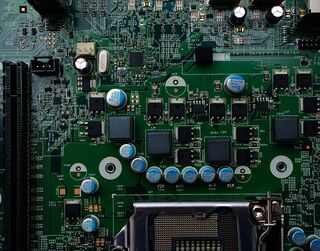
Chances are you've used one of these phrases recently, perhaps even today:
“I’ve got to reboot.”
“I’m searching my memory banks.”
“My brain needs an upgrade.”
“I’m having a system crash.”
“I’m processing.”
When we use this language, we are analogizing our brains with computers. I want to consider how the computer metaphor for the brain influences our daily lives. Whether we realize it or not, our default assumption is that the way to understand and fix what our brains are doing is the same as how we understand and fix our computers.
To some extent, this is justified since our brains do carry out computations to accomplish some tasks. The computer metaphor has guided neuroscience for more than half a century. It has helped spur important discoveries about fundamental brain processes, such as how the brain achieves visual perception.
But we are at a point of diminishing returns. The computer metaphor is leading us astray in neuroscience. We are trapped in its logic, and this has led to increasingly incoherent models of the brain. But the flaws of the metaphor have implications for our daily lives, too.
When something goes wrong on your laptop, the first response of most IT professionals to any problem is "try a reboot." It's a cliché for a reason: It often does solve the problem. And when your computer's problems are especially bad, an effective but drastic solution is often to "wipe" the memory and reinitialize the machine.
We may be tempted to desire a similarly clean and effective solution in our lives. In the mid-twentieth century, "electroshock" or electroconvulsive therapy (ECT) was conceived as a way to shock the computer-brain into a pure, error-free state. Today, the procedure is regularly characterized as a kind of hard “restart” for the mind. In rare and otherwise intractable cases of depression and other conditions, ECT can sometimes be effective. But it is neither viable nor useful for the vast majority of people.
Nor should we aspire to a softer reboot. Of course, the things we do to "reboot" like rest, spending time with friends, exercise, and so on can be beneficial to our mental health. The important thing, though, is that these activities succeed not by restarting your brain but rather by enriching it, and by helping you make better use of it in its current state. No sharp discontinuity is possible—or desirable.
Neuroscientists have known for many years that human memory does not work like computer memory. Our knowledge of past events involves complex associations among many kinds of information: different sensory inputs from most or all modalities (vision, hearing, smell, taste, etc.); the physical location where the event happened; what kind of reward we might have received then, and so on. And each time we think about a memory we permanently change it.
If computer memory worked this way it would be useless. Instead, computers employ a completely lossless and deterministic strategy of depositing data at a fixed location. The computer’s processor retrieves it and puts it back to the same place every time with perfect fidelity. This conception may have helped spur initial scientific exploration of human memory but today is obsolete.
But the metaphor is not just inappropriate; it is also unhelpful. Understanding and preserving our memory means leveraging its actual mechanisms. Memory retention can be improved using spatial mnemonics, or what is called the “memory palace” approach. The idea is to create a network of associations among multiple kinds of information, and to connect this network to a specific geographic anchor, such as different parts of the house you grew up in. This network, I believe, is better imagined as akin to the internet. In any case, we can all benefit from keeping in mind that our memories—and those of everyone else—are changeable. Memories do not record past events with full accuracy, no matter how vivid they appear.
The endpoint of following the computer metaphor to understand how our brains work is the idea that our brains are compatible with actual computers and can be upgraded this way. This is the idea of brain-computer interface and enhancement, a grand dream for many researchers and for business leaders like Elon Musk through his company, Neuralink.
The idea is to surgically install computer ports in people’s heads. It is suggested that the interface can not only read out our brain’s computations, perhaps as a way to “download” our memories, but that it can also transmit external stimulation from computers to the brain, thereby enhancing our thinking. Just this week, Musk’s partner, pop musician Grimes, volunteered to be one of the first human guinea pigs for this surgery.
Anyone considering this surgery should think carefully about the case of Phil Kennedy, a U.S. neurologist and brain interface evangelist who had electronics implanted in his own brain in an attempt to create an interface. The surgery had to be performed in Belize because no U.S. neurosurgeon would agree to do it. For weeks after the implantation, Kennedy suffered from profound speech loss as well as motor problems. The story of his ordeal is recounted in a fascinating and harrowing article in Wired by Daniel Engber:
In the afternoon, after the anesthesia had worn off, the neurosurgeon came in, removed his wire-frame glasses, and held them up for his bandaged patient to examine. “What are these called?” he asked.
Phil Kennedy stared at the glasses for a moment. Then his gaze drifted up to the ceiling and over to the television. “Uh … uh … ai … aiee,” he stammered after a while, “… aiee … aiee … aiee.”
Kennedy’s goal was noble and altruistic: He wanted to better understand how the human brain generates speech; his adventure was not borne out of a desire to enhance his own mind. But he was guided by the flawed computer metaphor, which implies that our brain’s computations can be directly tapped, read out, and enhanced. He eventually recovered speech but his self-experimentation led to little if any increase in understanding of the brain. Incredibly, Kennedy today remains a true believer in brain interfaces.

Beyond the utter recklessness of unnecessary brain surgery, there are so many other problems with brain-computer interfaces. What happens when your brain port becomes obsolete? The lifecycle of any digital technology is, if you’re lucky, a decade or two. (Laserdiscs, anyone?) The same will undoubtedly be true for brain ports and the software they require. It would be especially problematic if an obsolete port was located in a crucial part of the brain such as a motor or speech area where removing it could cause serious and irreparable damage. Kennedy’s now-disconnected electrodes will remain permanently lodged in his cortex and could well have negative effects later in his life. (For many more reasons for skepticism about brain-computer interfaces and other transhumanist enterprises, see the account in Mark O’Connor’s even-handed but ultimately damning book To Be a Machine.)
Your brain can't be upgraded like a computer because it is not a computer. It is much more than that. Yes, it performs computations as part of its many jobs. But I believe this metaphor is no longer helpful for neuroscientists, and it’s time everyone else stopped imagining the brain this way, too.
We are trapped in the computer metaphor in part because we lack an alternative. My new book An Internet in Your Head proposes an alternative: the internet metaphor. The internet's message-passing architecture—despite its potential for malevolent use—has virtues and engineering strategies that will help us understand how the brain actually works.
And if the internet metaphor is deployed in a cautious and limited way, it may even help us use our brains more effectively, and perhaps allow us to live better, healthier lives.
"really" - Google News
February 11, 2021 at 06:26AM
https://ift.tt/3aUSCjU
Do You Really Need a Brain "Upgrade"? - Psychology Today
"really" - Google News
https://ift.tt/3b3YJ3H
https://ift.tt/35qAk7d
Bagikan Berita Ini














0 Response to "Do You Really Need a Brain "Upgrade"? - Psychology Today"
Post a Comment